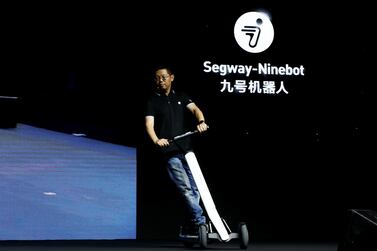Ride-hailing companies including Uber Technologies Inc. and Bolt Technology OU learned the hard way that turning up unannounced doesn’t work in Europe. Now one e-scooter startup seems keen to make the same mistake.
Late on October 7, the mayor of Luxembourg City received an email from US startup Bird Rides saying it would roll out its service overnight. The next morning, dozens of electric scooters lined the pavements. Just over a week later, on Thursday, Bird was forced to pause its service.
“It was a cloak and dagger operation Monday night, without anyone having really been informed,” said Dany Frank, spokeswoman of the Luxembourg Transport Ministry. “The way in which it was done wasn’t great.”
One of the EU’s smallest nations, Luxembourg has been promising to make public transport free of charge. City bikes, called Vel’OH!, and car-sharing services have existed for years, but adding electric scooters wasn’t planned.
The mayor, Lydie Polfer, has rejected requests by seven scooter firms over the past two years, her office said in an email. This included California-based Bird, which was told in early June there was no interest in its services.
The two sides met on Thursday, after which Bird said in a statement that it was "working to address the mayor’s concerns".
“We are temporarily pausing our service while we make these changes,” the company said. “While we know this is disappointing for the thousands of people who have already used Bird, we believe it is best to work closely with the cities we operate in, so we will make these changes first, before resuming the service.”
More than 2,000 people had already downloaded the app and taken a ride in the city, Bird said earlier.
The smash and grab attempt by Bird mirrors early attempts by Uber to expand across Europe, only to be banned by cities including Barcelona and Dusseldorf. Bolt was also turfed out of London for failing to have the correct license.
Scooter companies have spread across Europe, targeting tourist spots such as Paris and Lisbon, raising hundreds of millions of dollars of venture capital funding in the process. Bird is one of the world’s largest, and said earlier this month it had bagged another $275 million of financing to continue growing. Lime is another billion-dollar scooter behemoth whose bright green two-wheelers are a familiar site in many capital cities.
Judith Pretty, a British-Luxembourg national who’s lived in the country for 25 years, has mixed feelings about the scooters that are scattered across pavements just a few blocks from where she lives. She’s worried it will cause “a massive increase in accidents.”
Luxembourg’s population has grown rapidly in recent years to just over 600,000. Added to that, 200,000 commuters from neighbouring France, Belgium and Germany travel in and out of Luxembourg every day, meaning the few roads that lead to the centre are choked with traffic mornings and evenings.
For now, Luxembourg City refuses to say whether it will try to send Bird packing. While the commune said it welcomes initiatives that boost mobility, it “doesn’t appreciate the lack of information,” which raise “important questions of management and security.”
Ruben Costa, 23, likes the sudden addition to Luxembourg’s pavements. Freshly arrived from Portugal to do a five-month internship in the city as a translator, he says scooters “are all the rage” back home in Lisbon and “will certainly help with getting around traffic here too”.







